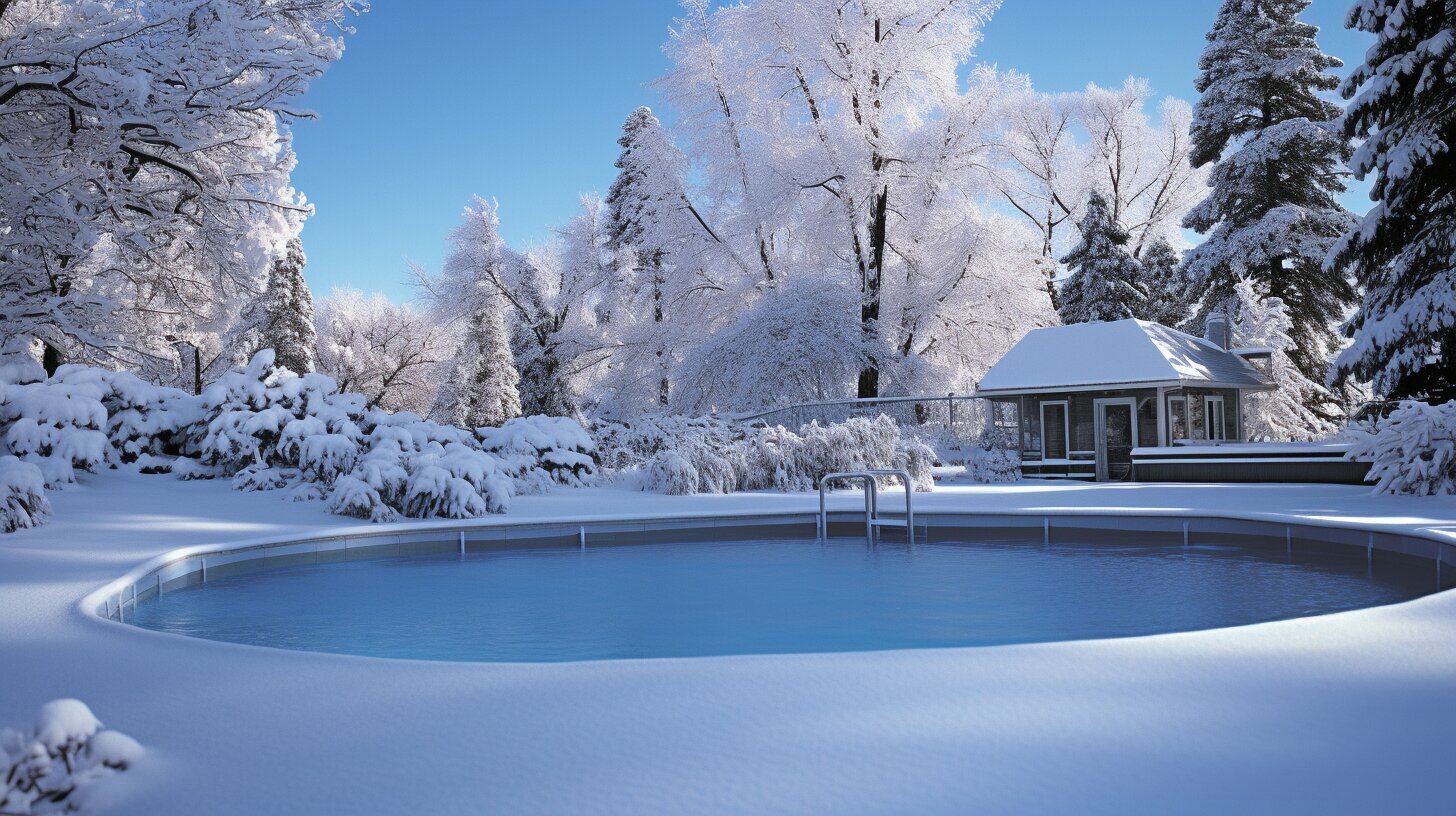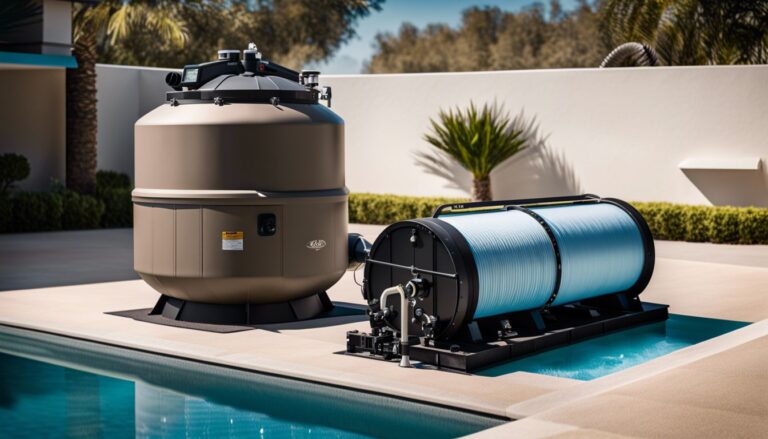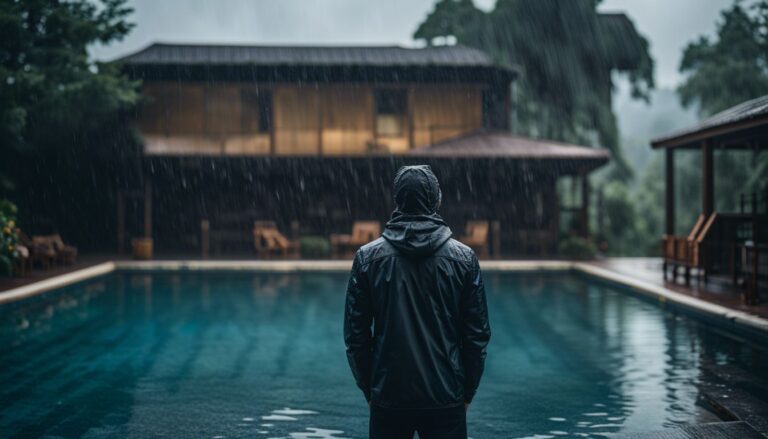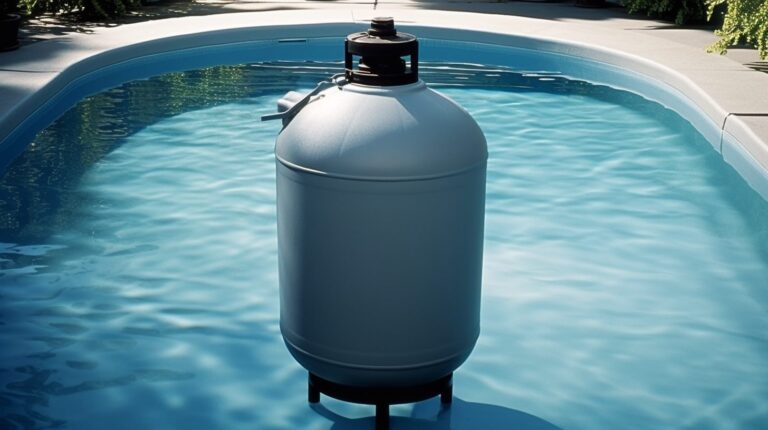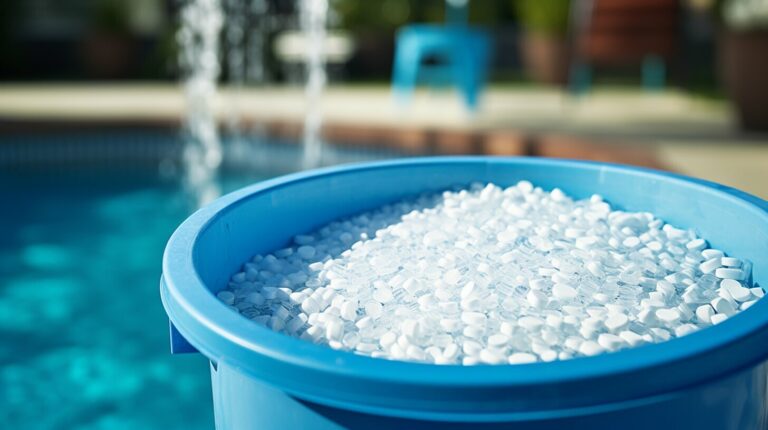Discover At What Temperature Does a Pool Freeze? Tips and Facts
What temperature does a pool freeze? As the winter months approach, pool owners must take extra measures to ensure their pool remains in top condition. Freezing temperatures can cause severe damage to the pool’s components, resulting in costly repairs. Understanding what temperature a pool is frozen and how to protect your pool during the colder months is crucial.
Water freezes below 32 degrees Fahrenheit, but often it needs to be colder before you start to get damage from pipes. We’ll look into how long it takes before you need to get worried!
Understanding the Freezing Point of Water
Knowing the freezing point of water is crucial for any pool owner during the winter months. Water freezes at 32 degrees Fahrenheit (0 degrees Celsius). At this temperature, water molecules slow down and form ice crystals, causing the water to solidify.
It’s important to note that some factors can impact the freezing point of water, such as the concentration of dissolved minerals and salts. However, in most cases, pool water will freeze when temperatures drop below 32 degrees Fahrenheit.
How Long Before Pipe Damage?
Want tons of data on how long a pipe takes to burst due to freezing temperatures? Check out this University of Illinois study, with more data than you will ever need!
When the temperature drops to freezing levels, it’s essential to take precautions to protect your pool and prevent severe damage. Without proper freeze protection, freezing water can cause irreversible damage to your pool’s pipes, tiles, and equipment.
Stay tuned to learn more about the factors affecting pool freezing, best practices for winterizing your pool, and tips for maintaining your pool and hot tub during freezing temperatures.
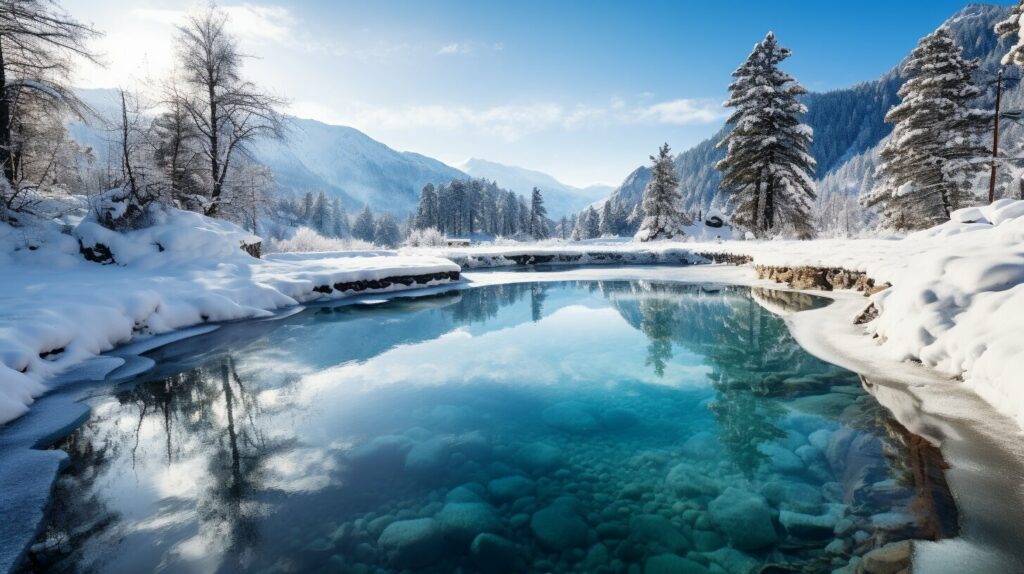
What Temperature Does a Pool Freeze: Factors Affecting the Freezing of a Pool
Several factors can affect the freezing of a pool during the winter months. Proper freeze protection is essential to prevent pool and component damage. Here are some crucial factors to consider:
| Factor | Description |
|---|---|
| Freeze Protectors | Installing freeze protectors is crucial to prevent water from freezing and causing damage to the pool’s components. Freeze protectors sense the drop in temperature and turn on the pool equipment, including the pump, to circulate the water and prevent freezing. Make sure to check the freeze protector regularly to ensure it’s functioning correctly. |
| Pool Heater | A nonelectric Pool Heater can be one of the easiest ways to warm the water. The downside is this is expensive, especially with a propane heater. A heat pump pool heater, while the most economical option for warm weather use, will not work at all when temperatures are cold. |
| Pool Cover | A Pool Cover can help reduce heat loss and evaporation, which can cause the water temperature to drop. Make sure to cover the pool when it’s not in use and avoid leaving gaps that allow cold air to seep in. |
| Proper Water Level | Maintaining the proper water level is critical to prevent pool equipment damage. The water level should be below the tile line and above the skimmer door. If the water level is too low, the skimmer can suck in the air and damage the pump, while too high can cause the water to freeze and damage the tiles. |
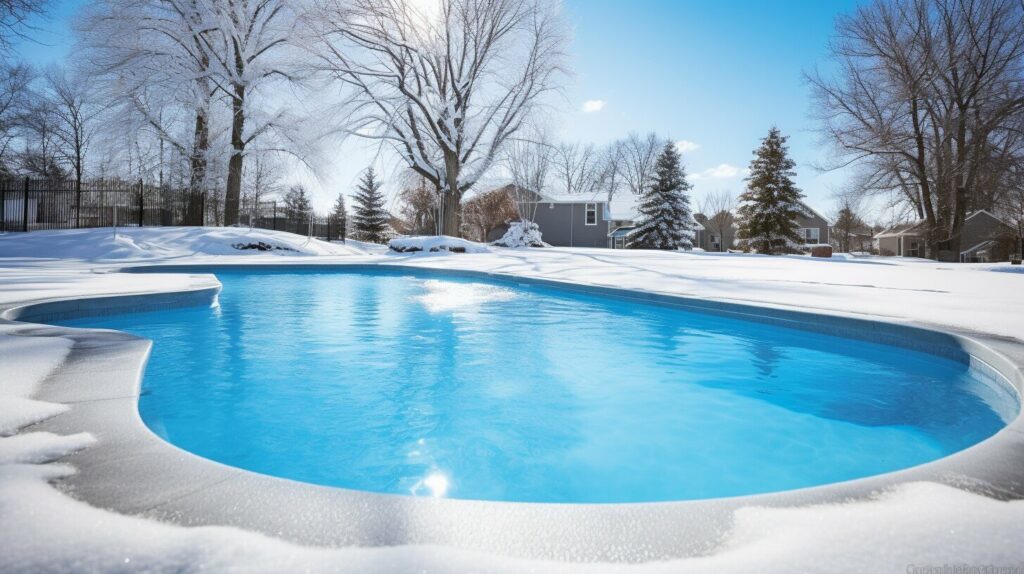
Best Practices for Winterizing Your Pool
Winterizing your pool is crucial to avoid freezing temperatures that can cause severe damage to your pool equipment and surfaces. Here are some best practices to protect your pool during the colder months.
1. Remove and Store Pool Accessories
Before winter sets in, remove and store all pool accessories, such as ladders, diving boards, and pool toys. This will prevent them from freezing and being damaged by the cold weather.
2. Lower the Water Level
Lowering the water level in your pool is vital to prevent freezing and expanding ice from damaging the pool walls and tiles. Drain water from the pool until the water level is below the skimmer and all water is drained from the equipment.
3. Add Winterizing Plugs and Pool Antifreeze
Winterizing plugs are used to seal off the pool’s plumbing and protect against freeze damage. Pool antifreeze can protect the pool’s plumbing in case of residual water or moisture. Ensure to follow the manufacturer’s guidelines for properly using and applying these products.
4. Open Drain Valves and Clean Filters
After you’ve added winterizing plugs and pool antifreeze, open all drain valves to prevent residual water from freezing in the pool pipes. Also, remove and clean all filters to prevent trapped water from freezing, which can cause damage to the filter system.
5. Cover Your Pool
A high-quality pool cover protects your pool from leaves, debris, and animals. Choose a cover that fits snugly over the pool and is made of durable material that can withstand extremely cold temperatures.
Best Pool Safety Covers

6. Consider Hiring a Professional
If you’re unsure about how to winterize your pool or don’t have the time to do it yourself, consider hiring a professional pool service. A pool service can ensure that your pool is properly winterized and ready for spring use.
The Role of Pool Equipment in Preventing Freezing
Aside from taking precautionary measures and winterizing your pool, your pool equipment plays a vital role in preventing freezing. Here are some pieces of pool equipment to focus on:
Filter Pump
Ensure that your filter pump is running during freezing temperatures. Running the pump circulates the water, preventing it from freezing and causing damage to the pool and its equipment. If you have a variable speed pump, set it to a higher speed to keep the water moving.
Heat Pump
If you have a pool heater, ensure it is properly maintained and functioning during winter. A heat pump can raise the water temperature before a short-duration freeze, preventing it from freezing and causing damage. Once the temperature drops, though, a heat pump will no longer work.

Auxiliary Pool Pumps
You may want to install an auxiliary pool pump to keep the water moving during freezing temperatures. This can be installed in addition to your filter pump, and can help prevent freezing and damage.
In this case,, you’d also want to ensure you can run the pump during a power outage such as a generator. In 2021 in Texas, many homeowners suffered pool damage from a power outage during a freeze!
Pool Cover
A pool cover can help keep the water warm and prevent it from freezing. Ensure your pool cover is properly installed and anchored to keep it in place during winter storms.
Caring for your pool equipment and ensuring it is properly functioning can prevent freezing and avoid costly repairs.
Protecting Pool Pipes and Tiles from Freezing
One of the main concerns when dealing with freezing temperatures is protecting your pool’s pipes and tiles. Frozen pipes can lead to costly repairs and damage your pool’s equipment, while frozen tiles can crack or become dislodged.
| Tip | Description |
|---|---|
| Keep water flowing | Insulating your pool’s pipes can also help prevent freezing. You can use foam insulation sleeves or wrap pipes in heat tape. Make sure to cover all exposed pipes, including those above ground. |
| Add insulation | Before winter hits, drain all water lines, including those that lead to your pool’s heater or other equipment. This will ensure there’s no excess water that could potentially freeze and cause damage. |
| Drain water lines | Use an air temperature sensor. |
| Check skimmer doors | Before winter hits, drain all water lines, including those that lead to your pool’s heater or other equipment. This will ensure no excess water that could freeze and cause damage. |
| Use an air temperature sensor | Investing in an air temperature sensor can help you monitor the temperature around your pool and alert you if it drops too low. This can give you time to take action and prevent any potential damage. |
By taking these steps, you can help ensure your pool’s pipes and tiles stay protected during freezing temperatures.

Dealing with Extreme Cold and Power Outages
While a properly winterized pool is designed to withstand cold weather, extreme cold temperatures, and power outages can still cause severe damage to your pool equipment. If you experience a power outage during a cold snap, taking action quickly and appropriately is important to protect your pool.
If the power goes out and temperatures dip below freezing, it is important to:
- Turn off your pool equipment.
- Open any nearby drain valves to allow water to escape and prevent damage to your pool’s pipes.
- Add antifreeze to your pool’s plumbing lines to prevent freezing.
- Monitor your pool’s water level, adding water if necessary to prevent damage to your pool tiles.
It is important to note that a power outage during the winter months can cause your pool to freeze quickly. To avoid damage, take immediate action if you experience a power outage during cold weather.
If you live in an area with frequent power outages or extremely cold temperatures, you may want to consider investing in a generator or other backup power source for your pool equipment. This will help protect your pool even during a power outage.
Note: Always follow the manufacturer’s instructions for your pool equipment and consult a professional if you experience any issues or concerns.
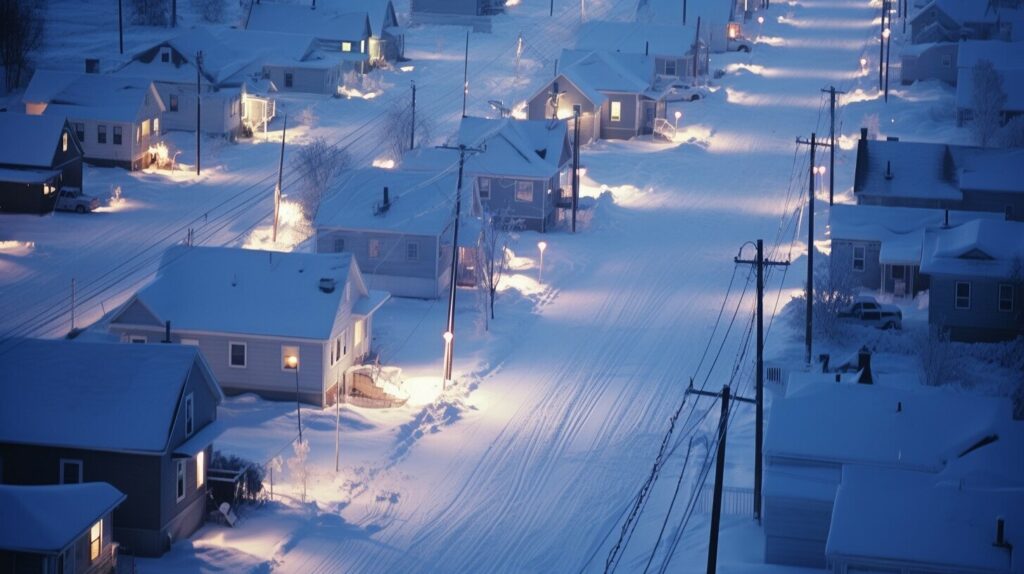
“If the power goes out and temperatures dip below freezing, it is important to turn off your pool equipment, open any nearby drain valves to allow water to escape and prevent damage to your pool’s pipes, and if possible, add antifreeze to your pool’s plumbing lines to prevent freezing…”
Tips for Maintaining a Hot Tub in Freezing Temperatures
Hot tubs are designed to provide soothing relaxation and warm water during cold weather. However, special care is required to keep your hot tub in optimal condition when the temperature drops below freezing. Follow these tips to ensure your hot tub stays in good working order and provides maximum comfort when the weather is cold.
Keep the Hot Tub Covered
One of the most important things you can do to protect your hot tub during freezing weather is to keep it covered. Make sure the cover is secure and fits tightly around the hot tub. This will help to retain heat and prevent cold air from entering the hot tub, which can cause the water to freeze.
Maintain the Water Temperature
During freezing weather, it is important to keep the water temperature in your hot tub high enough to prevent it from freezing. The ideal water temperature is between 100 and 104 degrees Fahrenheit. Check the temperature regularly to make sure it stays within this range.
Run the Jets Regularly
Running the jets in your hot tub regularly can help to circulate the water and prevent it from freezing. If you have a programmable hot tub, set it to run the jets for a few minutes every hour. Otherwise, turn on the jets manually every few hours.
Add Hot Tub Antifreeze
Adding hot tub antifreeze to the water can help to prevent it from freezing. Follow the manufacturer’s instructions for the amount of antifreeze to add based on the size of your hot tub.
Protect the Hot Tub Components
The components of your hot tub, such as the pump, filter, and heater, can be damaged by freezing temperatures. Ensure they are protected by wrapping them in insulation or using specialized hot tub covers.

FAQ – Frequently Asked Questions
Here are some common questions about freezing pools and tips to keep them from freezing during the winter:
Q: What are drain plugs used for during the winter season?
A: Drain plugs are an essential tool when winterizing your pool. They prevent water from entering the pipes, thus reducing the risk of frozen pool water leading to costly damage.
Q: What are the potential risks to above-ground pools during low temperatures?
A: Above-ground pools can be more susceptible to the effects of freezing. The pool system, including the pump basket and filtration pump, can be damaged if water freezes and expands.
Q: Why is maintaining the proper pool water level crucial in cold months?
A: Maintaining the proper pool water level is key. If the water level is too low, it might not reach the skimmer baskets, affecting the pool’s filtration and increasing the chance of a frozen pool. Conversely, too much water can cause ice sheets to form and damage the pool structure.
Q: How can I utilize an automation or electronic control system for freeze protection?
A: These systems can automate your pool care. For instance, a temp sensor can detect when water temperatures drop too low and trigger the pump to run automatically, maintaining water movement and preventing freezing.
Q: Should I remove the skimmer baskets during winter?
A: It’s a good idea to remove the skimmer and drain filter baskets as part of your weekly pool maintenance services. This action prevents damage from freezing water.
Q: What role does the control panel play in preventing pool freezes?
A: The control panel of the pool’s automation system can be programmed to activate your pool equipment, like auxiliary pumps or pool cleaner pumps, when the air temperature drops to a certain level. This process keeps the water moving, which can prevent freezing.
Q: How do I protect the bottom of my pool pump during freezing weather?
A: You can use electrical heat strips to add heat to the equipment pad area. This method prevents ice accumulation around your pool equipment, minimizing the potential for freeze damage.
Q: What can I do to protect my saltwater pools during the time of year when hard freezes are possible?
A: Adding a solar cover for saltwater pools can help retain heat and prevent the water feature pumps from freezing. Make sure to perform routine checks and keep the pool in the middle of the tile line for the best protection.
Q: Why does a frozen pool threaten the pool filter?
A: When a pool freezes, the expanding ice can cause pressure build-up in the pool system, including the pool filter. This pressure can lead to costly freeze damage. That’s why moving water, like running the spa jets or water features, can help prevent this situation.
Q: What is the first thing I should do during a freeze warning?
A: During a freeze warning, the first step is to ensure all your pool equipment is running, including your pool and spa jets and auxiliary pumps. This process keeps the water moving, preventing it from freezing into an ice cube and causing potential damage.
Q: Why is it important to keep the water’s surface moving during the cold months?
A: Keeping the water’s surface moving prevents the formation of a thin sheet of ice. If the water freezes, it can exert pressure on the pool walls and system, potentially causing costly damage.
Q: What role do pool care experts play in winter pool maintenance?
A: Pool care experts offer valuable services, like regular inspections and preventative maintenance, to keep your swimming pool equipment in shape. They can advise on best practices and implement measures to prevent costly freeze damage during winter.
Following these tips and taking the necessary precautions can keep your pool and hot tub from freezing during the colder months.
